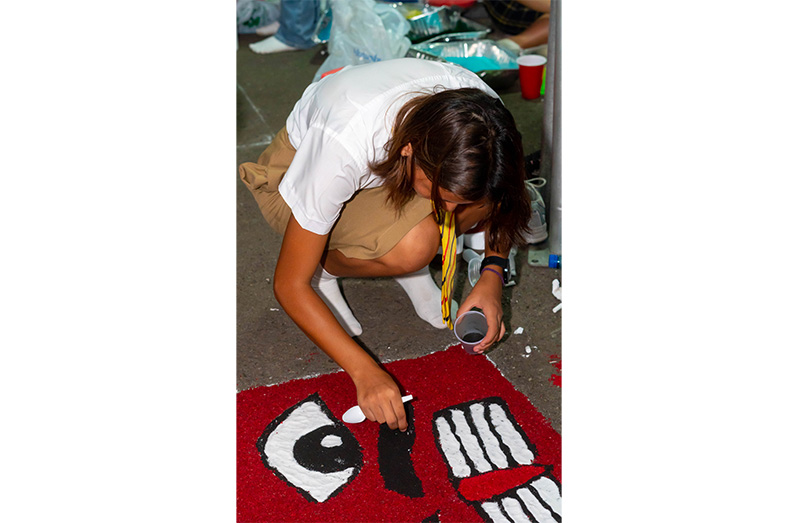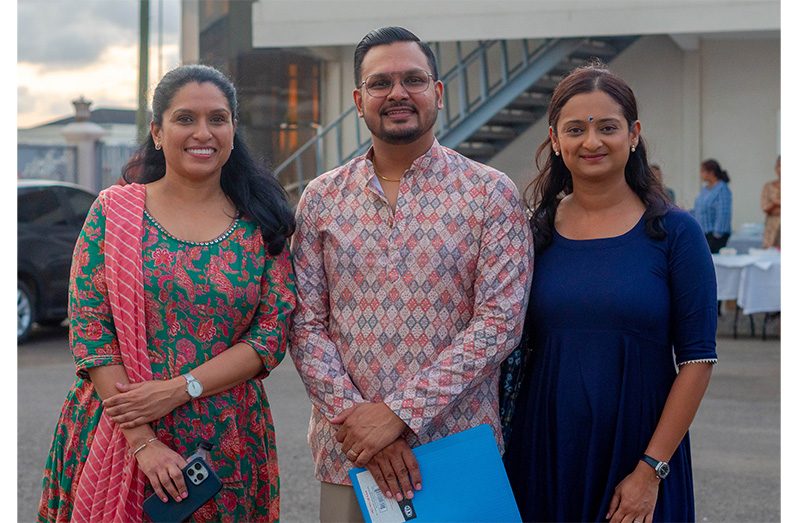From vibrant motorcades to reflective family rituals, Diwali illuminates the spiritual and cultural heartbeat of Guyana
EVERY year, as homes glow with rows of diyas and the smell of traditional sweet treats fills the air, Diwali—the festival of lights—transforms Guyana into a tapestry of colour, sound, and devotion. For many, it is a time of joy and celebration; for the Guyanese Hindu community, it carries a deeper spiritual significance. This week, Pepperpot Magazine sat down with three members of the Guyana Hindu Dharmic Sabha to explore what makes Diwali so meaningful, and how it shapes not only Hindu lives but the culture of Guyana at large.
A reminder to reflect
Pandit Omkaar Tewari, a spiritual leader with the Sabha, described Diwali as much more than a display of lights. “Diwali is associated with Lakshmi Puja,” he explained. “Lakshmi being the goddess of wealth, good fortune, success, and auspiciousness. ‘Laksh’ is a Sanskrit word; it means a mark or a sign. Everything associated with purity, good fortune, success, we associate with Mahalakshmi,” he said. For Pandit Tewari, the festival is as personal as it is religious, describing it as a time for families and households to celebrate collectively in the light that Diwali brings. “Diwali is that beautiful festival where we welcome her into our homes and the very core of our hearts, so that she can be our guiding light. She’s also the goddess of light. Wherever there is darkness, inside or outside, we pray that she dispels that darkness.”

He recalled growing up celebrating Diwali with awe—both for the vibrant spectacle and for its deep spiritual meaning. Diwali’s festivities include a number of eye-catching traditions: vibrant decorations, colourful rangoli designs, and the Sabha’s renowned Diwali motorcades. Yet the festival also carries a reflective purpose. “It’s a time to reflect on the habits we want to let go of,” he said. “Darkness does not only come physically and with physical enemies, but also within. Darkness comes in the form of vices like negativity, dishonesty, hatred, jealousy, ego. Diwali is a time to confront that darkness, to make change in our spiritual journeys. It starts with you. We all want a world of peace and love, but sometimes we all have our wars that we battle each day. The festival teaches us to imbibe great qualities and virtues, and overcome darkness in our lives.”
Celebrations that shape Diwali
The community celebrations are what truly bring these lessons to life, particularly through events that engage children and adults alike. Zahra Alli of the Sabha outlined some of the activities that mark the season. “Around Diwali, we have three main events that happen across the country,” she said. “The first is the inter-schools rangoli competition. Children are asked to depict the story of Diwali using rice and coloured sands, and they’re judged on their use of colour, creativity, and ability to tell the story visually,” she added.
Moreover, Alli explained that the tradition of community engagement deepened during the COVID-19 pandemic and gave rise to one of the Sabha’s most popular celebrations of the season, Deep Jale. “During the pandemic, we launched Deep Jale. Since we could not be together because of health restrictions, we had central points in communities where a diya would be lit or a murti of Mother Lakshmi would be displayed. Even during that period, each village felt the presence of Lakshmi and the spirit of Diwali,” she said.
The motorcades have become a hallmark of the festival, drawing crowds from across Guyana. “Now, even as COVID has passed, we continue Deep Jale as a prelude to the motorcades,” Alli said. “Our motorcades are very popular; they are known throughout the Caribbean. This year we have three—Essequibo on Thursday night, the West Coast on Friday night, and the biggest, culminating on Sunday night, leaving from the Shri Krishna Mandir in Campbellville to LBI.”
The motorcades, Alli noted, are more than visual spectacles; they are a vital part of the festivities. “There are categories—small, medium, large, commercial—but each year, the creativity is mind-blowing. Groups, businesses, they all want to outdo each other. Each year, the competition gets harder to judge, but it’s spectacular. Like the rangoli competition, participants are judged on creativity and how well they convey the story of Diwali.”
Diwali and culture
For those who have witnessed the motorcades for years, Diwali’s energy is palpable. Trishala Persaud, another member of the Sabha, said the motorcade has long been a highlight of Diwali for her. “The highlight for me is at the Shri Krishna Mandir in Campbellville when the floats assemble,” she said. “It’s the one moment when you can see the floats close up for a longer period, feel the excitement of participants, and experience the energy. As the motorcade moves along the streets, the crowds, especially children, look on in wonder. It’s just a mood that’s truly amazing,” she said.
However, Persaud emphasised that the motorcades do more than just mark the day; they bring Diwali to everyone, transcending religious boundaries. “It involves the entire Guyanese population. People feel like they are part of Diwali. Many tell us they came as children and now bring their children and grandchildren to see the motorcades. That continuity is special. Over the years, we’ve added other activities, like the rangoli competition in schools, celebrations at offices, and Deep Jale in communities. All these elements build appreciation for the festival, foster community spirit, and encourage respect for different cultures,” she said.
This inclusivity and sense of unity, Persaud said, is part of what makes Diwali in Guyana unique. “Guyana is a multicultural country. We celebrate all of the festivals. Everyone celebrates each other’s festivals, and that should never be taken for granted. The motorcade and other activities allow young people to understand the significance of Diwali, to learn about the festival and its traditions. It’s a way to explain what Diwali is, how we celebrate it, and why it matters in Guyana.”
The festival of lights reflects both the spiritual and social fabric of the country. As Pandit Tewari noted, Diwali is a reminder to confront darkness and nurture light—both within and in the world around us. Through motorcades, rangoli competitions, Deep Jale, and family gatherings, the celebration unites Guyanese families and communities in reflection, creativity, and joy.



.jpg)








